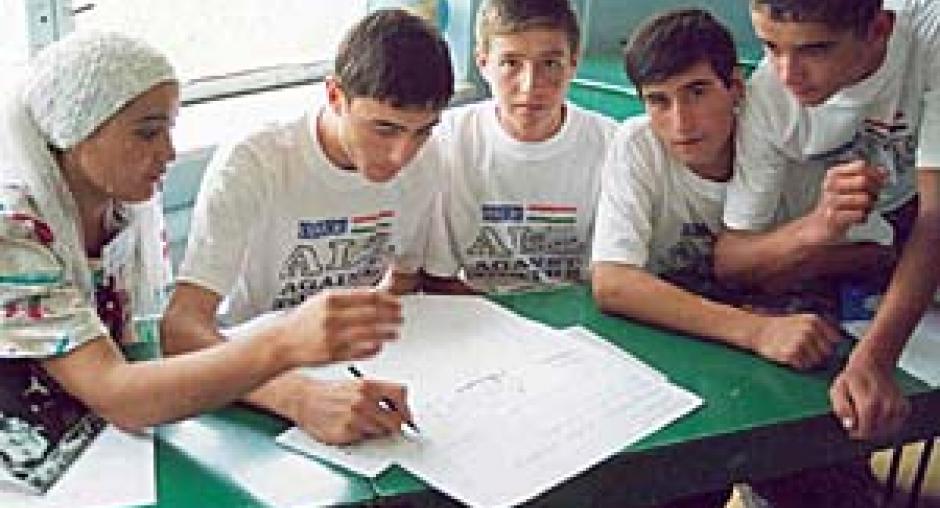Newsroom
Environment information resource centre opens in Tajikistan with OSCE support
DUSHANBE 23 September 2003

(OSCE)Students in Tajikistan participating in OSCE-supported training workshops learn how to protect their environment, July 2003. (OSCE) Photo details
DUSHANBE, 23 September - The Aarhus Resource Centre was officially opened in Dushanbe today, as the next step in an ongoing co-operation process between the OSCE Centre in Dushanbe and the Tajik Ministry of Nature Protection over the implementation of the Aarhus Convention in Tajikistan.
In a welcoming speech, First Deputy Minister of Nature Protection, Rustam Latipov, emphasized that the opening of the resource centre was a significant event in the social and political life in the country: "This is one more important step in the process of democratization and development of transparency", he said.
The Head of the OSCE Centre in Dushanbe, Yves Bargain, described the Aarhus Convention as a unique international environmental agreement, which links environmental rights and human rights. "The OSCE promotes the convention in order to strengthen the civil society and democratization. It must be stressed that big progress has been made in the past three years in the implementation of the Aarhus Convention in Tajikistan", he added.
The Aarhus Resource Centre in Dushanbe will become a resource information base for the public and governmental officials in realizing the basic provisions of the Aarhus Convention. It will serve as a link between the Government and non-governmental organizations (NGOs) in the sphere of environmental policy making and implementation in Tajikistan.
It will provide the people with information on environmental issues, open a website on the Aarhus Convention in Tajikistan, publish quarterly bulletins, keep an inventory of the ecological information stored in different organizations, as well as organize an Aarhus Centre library.
Sirrodidin Aslov, Chairman of the International Fund for Saving the Aral Sea, has already agreed that the Fund was ready to exchange and provide information to the Aarhus Resource Centre.
Around 40 people took part in the event, representing the ministries of nature protection, education, water management, and foreign affairs, as well as Parliament, the Presidential administration, embassies, NGOs and international organizations.
These included the UN Development Programme, the World Bank, the Swiss Agency for Development and Co-operation (SDC), and Central Asian Mountain Partnership (CAMP).
In a welcoming speech, First Deputy Minister of Nature Protection, Rustam Latipov, emphasized that the opening of the resource centre was a significant event in the social and political life in the country: "This is one more important step in the process of democratization and development of transparency", he said.
The Head of the OSCE Centre in Dushanbe, Yves Bargain, described the Aarhus Convention as a unique international environmental agreement, which links environmental rights and human rights. "The OSCE promotes the convention in order to strengthen the civil society and democratization. It must be stressed that big progress has been made in the past three years in the implementation of the Aarhus Convention in Tajikistan", he added.
The Aarhus Resource Centre in Dushanbe will become a resource information base for the public and governmental officials in realizing the basic provisions of the Aarhus Convention. It will serve as a link between the Government and non-governmental organizations (NGOs) in the sphere of environmental policy making and implementation in Tajikistan.
It will provide the people with information on environmental issues, open a website on the Aarhus Convention in Tajikistan, publish quarterly bulletins, keep an inventory of the ecological information stored in different organizations, as well as organize an Aarhus Centre library.
Sirrodidin Aslov, Chairman of the International Fund for Saving the Aral Sea, has already agreed that the Fund was ready to exchange and provide information to the Aarhus Resource Centre.
Around 40 people took part in the event, representing the ministries of nature protection, education, water management, and foreign affairs, as well as Parliament, the Presidential administration, embassies, NGOs and international organizations.
These included the UN Development Programme, the World Bank, the Swiss Agency for Development and Co-operation (SDC), and Central Asian Mountain Partnership (CAMP).
